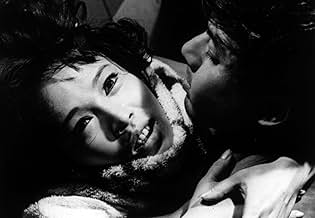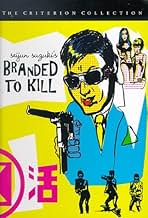NOTE IMDb
7,2/10
11 k
MA NOTE
Après une mission ratée, un tueur à gages se retrouve en conflit avec son organisation, et un mystérieux et dangereux homologue en particulier.Après une mission ratée, un tueur à gages se retrouve en conflit avec son organisation, et un mystérieux et dangereux homologue en particulier.Après une mission ratée, un tueur à gages se retrouve en conflit avec son organisation, et un mystérieux et dangereux homologue en particulier.
- Réalisation
- Scénario
- Casting principal
- Récompenses
- 1 victoire au total
Jô Shishido
- Gorô Hanada
- (as Joe Shishido)
Annu Mari
- Misako Nakajô
- (as Anne Mari)
Akira Hisamatsu
- Ophthalmologist
- (as Kôsuke Hisamatsu)
Kôji Seyama
- Restaurant Guest
- (as Takashi Seyama)
Avis à la une
Man, why are those late 60's / early 70's criminal movies so fantastically good? I guess it must have something to do with those old saturated film stocks. If only Kodachrome would muster the courage to bring back what brought us the those classics: Dirty Harry, Bullitt, The Getaway etc.
Or then again, maybe it was just the period in which these movies were made. The hippie era did, as it would appears produced a surprisingly good number of film titles. Comparatively, Branded to Kill reminds one distinctively in style to John Boorman's film of the same year, POINT BLANK, both in choice of film stock and composition of photography, but aside from this the films are completely different. Branded to Kill tells the story of a yakuza hitman (with a penchant for fast woman and inhaling "rice steam") who seeks the desirable title of #1 gunman. But of course, it's not going to be that easy...
Or then again, maybe it was just the period in which these movies were made. The hippie era did, as it would appears produced a surprisingly good number of film titles. Comparatively, Branded to Kill reminds one distinctively in style to John Boorman's film of the same year, POINT BLANK, both in choice of film stock and composition of photography, but aside from this the films are completely different. Branded to Kill tells the story of a yakuza hitman (with a penchant for fast woman and inhaling "rice steam") who seeks the desirable title of #1 gunman. But of course, it's not going to be that easy...
Rice-sniffing, #3 Killer, dead butterflies, snuff films. Where to start? 'Koroshi no rakuin' is a surreal, Kafkaesque, timewarp of a film masquerading as a stylish 60's hit-man movie. Nikkatsu Studios fired Seijun Suzuki over this film's "incomprehensibility."
Suzuki is an auteur of the highest magnitude, nobody has ever used a widescreen, black and white, "Nikkatsu Scope" frame quite like him. The dense and beautifully chaotic images are overwhelming on your first viewing, it's the sort of movie that shows you something new every time you watch it.
Essentially Hanado Goro (Jo Shisido) is the yakuza's #3 Killer, but he desperately wants to be #1. As might be expected, being a hired gun is a stressful life and Hanado takes the edge off with lots of sex and the smell of boiling rice. The sex gets him embroiled in some sort of a plot and he finds himself getting much better acquainted with #1 Killer than he'd ever wanted to be.
Time backs up, swirls around, restarts, slows down. Major themes include, but are not limited to: ambition, lust, rivalry, bureaucracy, addiction, loss of self-control. There's a certain parallel in that with this picture Suzuki derailed his own career as a "salary man" making Nikkatsu yakuza flicks, many of Hanado's thoughts and impulses must have been the director's own.
Suzuki is an auteur of the highest magnitude, nobody has ever used a widescreen, black and white, "Nikkatsu Scope" frame quite like him. The dense and beautifully chaotic images are overwhelming on your first viewing, it's the sort of movie that shows you something new every time you watch it.
Essentially Hanado Goro (Jo Shisido) is the yakuza's #3 Killer, but he desperately wants to be #1. As might be expected, being a hired gun is a stressful life and Hanado takes the edge off with lots of sex and the smell of boiling rice. The sex gets him embroiled in some sort of a plot and he finds himself getting much better acquainted with #1 Killer than he'd ever wanted to be.
Time backs up, swirls around, restarts, slows down. Major themes include, but are not limited to: ambition, lust, rivalry, bureaucracy, addiction, loss of self-control. There's a certain parallel in that with this picture Suzuki derailed his own career as a "salary man" making Nikkatsu yakuza flicks, many of Hanado's thoughts and impulses must have been the director's own.
Wow, I thought the Japanese turned out some weird stuff nowadays. That lame crap has nothing on this wacky thing, which requires about 57 viewings to make any kind of narrative sense.
Jo Shishido (who has cheek implants (!!) that make him look like a chipmunk) is the third best killer in Japan. Apparently, all assassins in Japan do, other than kill people, is try to better themselves in the rankings. It's much like Pokemon, in a way. Jo strives to be number one, but, not only does he have to get past a bunch of backstabbers, he has to find the #1 Phantom, the high man on the totem. And when he does, it's rip roarin' nonsense time!
It's hard to tell if this is a work of genius or of pure insanity. There's no real narrative; more like a bunch of scenes held together by the fact they're all in the same movie. Some of the stuff is so nutty, it's hard not to call it brilliant, like when Jo finally does meet Phantom and they have a sit-down, Phantom pisses his pants rather than get up and take his eyes off Jo. Or the hit that gets foiled by a butterfly. Or Jo's girlfriend's obsession with dead bugs, which lay in piles on the floor. Or the shocking amount of sex and violence in a movie made in 1967. It's really no surprise that the director had his contract summarily terminated when the studio watched this: it is the weirdest movie to come out of Japan in 1967. Or maybe ever. Be prepared to watch more than once.
Jo Shishido (who has cheek implants (!!) that make him look like a chipmunk) is the third best killer in Japan. Apparently, all assassins in Japan do, other than kill people, is try to better themselves in the rankings. It's much like Pokemon, in a way. Jo strives to be number one, but, not only does he have to get past a bunch of backstabbers, he has to find the #1 Phantom, the high man on the totem. And when he does, it's rip roarin' nonsense time!
It's hard to tell if this is a work of genius or of pure insanity. There's no real narrative; more like a bunch of scenes held together by the fact they're all in the same movie. Some of the stuff is so nutty, it's hard not to call it brilliant, like when Jo finally does meet Phantom and they have a sit-down, Phantom pisses his pants rather than get up and take his eyes off Jo. Or the hit that gets foiled by a butterfly. Or Jo's girlfriend's obsession with dead bugs, which lay in piles on the floor. Or the shocking amount of sex and violence in a movie made in 1967. It's really no surprise that the director had his contract summarily terminated when the studio watched this: it is the weirdest movie to come out of Japan in 1967. Or maybe ever. Be prepared to watch more than once.
The number-three-ranked hit-man (who makes these rankings?), with a fetish for sniffing boiling rice, fumbles his latest job, which puts him into conflict with a mysterious woman whose death wish inspires her to surround herself with dead butterflies and dead birds. Worse danger comes from his own treacherous wife and finally with the number-one-ranked hit-man, known only as a phantom to those who fear his unseen presence. Number One proves to be a nut, willing to go to great lengths to torment his victim, even sleep in the same bed with him. He's also so dedicated to his job that he'll urinate on himself rather than take his eyes off his victim by going to the toilet.
I'm getting used to the idea of a certain type of crime film that is so densely plotted you never quite know what's going on and are forced to give up on it in order to enjoy the picture. American films of this type, such as "The Maltese Falcon," are usually so deftly put together that you don't realize you haven't followed everything until you stop to think about it. Other countries produce films that require a bit more patience. I recently watched the French gangster pic, "Le Doulos" (1962), and learned early to resign myself to semi-confusion.
This film, from the nutty Japanese director, Seijun Suzuki, requires a extra level of resignation. Often I couldn't tell what was happening from shot to shot. Suzuki's disorienting style is sometimes marvelous and sometimes irritating; but I can't say I was ever bored. Many of the effects in this sex-and-violence-packed film are dazzling. I especially liked how the femme fatale, in her early close-ups, is perpetually drenched by a downpour whether she's out in the rain or not.
I enjoyed this film, but any viewer can be forgiven for giving up on it and saying, "I don't get it." There's no deep meaning to get. You either abandon yourself to the goofy entertainment being offered, or you don't.
I'm getting used to the idea of a certain type of crime film that is so densely plotted you never quite know what's going on and are forced to give up on it in order to enjoy the picture. American films of this type, such as "The Maltese Falcon," are usually so deftly put together that you don't realize you haven't followed everything until you stop to think about it. Other countries produce films that require a bit more patience. I recently watched the French gangster pic, "Le Doulos" (1962), and learned early to resign myself to semi-confusion.
This film, from the nutty Japanese director, Seijun Suzuki, requires a extra level of resignation. Often I couldn't tell what was happening from shot to shot. Suzuki's disorienting style is sometimes marvelous and sometimes irritating; but I can't say I was ever bored. Many of the effects in this sex-and-violence-packed film are dazzling. I especially liked how the femme fatale, in her early close-ups, is perpetually drenched by a downpour whether she's out in the rain or not.
I enjoyed this film, but any viewer can be forgiven for giving up on it and saying, "I don't get it." There's no deep meaning to get. You either abandon yourself to the goofy entertainment being offered, or you don't.
Seijun Suzuki refers to his films as "entertainment" and without critical merit. Yet, this was somewhat tongue in cheek as he stated that critics feel a movie must have a "moral or some social commentary" to be worthy of attention. Be that as it may, "Branded to Kill" is simply a fantastic achievement. Suzuki was working with both a lead man and a script provided to him by the Nikkatsu Corporation. As such, when you evaluate his films, you do so by focusing on the technical merits. Personally, I find his disconnected editing, and surreal lighting styles to be amazing. Suzuki's skill turns what is otherwise a laughable boiler plate film noir into something more. The lighting and editing make the exclamations that the script doesn't, and the decision to shoot the final scene in a boxing ring is brilliant.
It was entertaining to watch person after person jump up and down about the originality of "Ghost Dog" with no mention of the fact that Jarmusch lifted one of the assassination sequences unchanged from "Branded to Kill". Hopefully as more of Suzuki's work comes to DVD, people and critics alike will recognize a blatant tribute when it is given. Suzuki deserves them all.
It was entertaining to watch person after person jump up and down about the originality of "Ghost Dog" with no mention of the fact that Jarmusch lifted one of the assassination sequences unchanged from "Branded to Kill". Hopefully as more of Suzuki's work comes to DVD, people and critics alike will recognize a blatant tribute when it is given. Suzuki deserves them all.
Le saviez-vous
- AnecdotesWhen Nikkatsu studio executives saw the finished product, they thought it was too terrible to be released, so they shelved it. Seijun Suzuki along with others in the film business, film critics, and students protested in unfairness since, by contract, Nikkatsu was supposed to release the finished film theatrically. It went to court, with a ruling in favor of the director. Nikkatsu had to pay for damages and have the film released. Suzuki's contract with Nikkatsu was terminated, and with the bad reputation, was unable to work on a feature film for the next 10 years.
- Citations
Misako Nakajô: My dream is to die.
- ConnexionsFeatured in Seijun Suzuki | TCM (2013)
- Bandes originalesKoroshi no buruusu (Killing Blues)
Lyrics by Hachiro Guryu (Yasuaki Hangai, Takeo Kimura, Yutaka Okada, Chûsei Sone, Seijun Suzuki, Yôzô Tanaka, Seiichiro Yamaguchi and Atsushi Yamatoya)
Music by Kagehisa Kusui
Sung by Atsushi Yamatoya
Meilleurs choix
Connectez-vous pour évaluer et suivre la liste de favoris afin de recevoir des recommandations personnalisées
- How long is Branded to Kill?Alimenté par Alexa
Détails
- Durée1 heure 31 minutes
- Couleur
- Rapport de forme
- 2.35 : 1
Contribuer à cette page
Suggérer une modification ou ajouter du contenu manquant
























